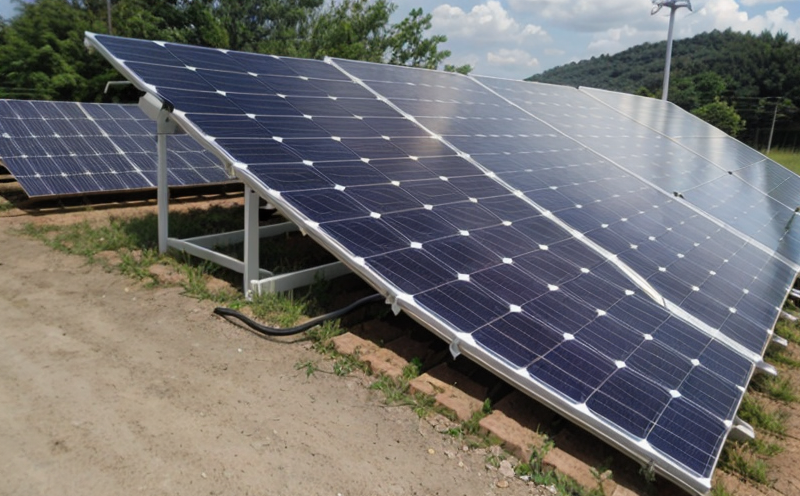IEC 60904-3 Reference Solar Spectral Irradiance Testing
The International Electrotechnical Commission (IEC) standard IEC 60904-3 sets the global benchmark for testing photovoltaic devices. This service ensures that solar panels and photovoltaic modules meet stringent international requirements regarding reference spectral irradiance, which is a critical factor in determining their performance under real-world conditions.
Reference spectral irradiance is essential because it defines the standard test conditions (STC) used to measure the electrical performance of photovoltaic devices. This testing ensures that the solar panels and modules are accurately characterized before they enter the market, thus promoting fair competition among manufacturers and ensuring consumer safety and satisfaction.
The IEC 60904-3 compliance is particularly important for quality managers and R&D engineers who need to ensure their products meet international standards. This testing not only aids in regulatory compliance but also supports continuous product improvement and innovation in the renewable energy sector. Compliance with this standard enhances brand reputation, consumer trust, and market competitiveness.
The testing process involves simulating solar irradiance conditions that are representative of real-world scenarios. This is achieved using a reference solar simulator capable of generating a wide range of spectral irradiances over time. The accuracy of the reference source is crucial to ensure precise measurements.
For effective testing, specimens must be prepared according to stringent guidelines provided by IEC 60904-3. This includes proper mounting and positioning within the test chamber to avoid any shadowing or reflections that could affect the results. The testing apparatus typically consists of a solar simulator equipped with a monochromator and detectors capable of measuring spectral irradiance at various wavelengths.
The acceptance criteria for this type of testing are based on international standards, which define acceptable deviations in performance metrics from specified reference conditions. These criteria ensure that only high-quality products pass the test, thus maintaining the integrity of the industry.
In summary, IEC 60904-3 compliance is essential for manufacturers aiming to enter or expand their presence in global markets. This service ensures that solar panels and photovoltaic modules meet the highest international standards, providing reliable performance data under defined test conditions.
Benefits
- Ensures compliance with IEC 60904-3 international standard for reference spectral irradiance testing.
- Provides accurate and consistent measurement of photovoltaic device performance.
- Safeguards against non-compliance risks by ensuring products meet global standards.
- Supports continuous improvement in product design and quality assurance processes.
- Enhances brand reputation and market competitiveness through adherence to international benchmarks.
Eurolab Advantages
EuroLab offers comprehensive services for IEC 60904-3 compliance testing, ensuring that your solar panels and photovoltaic modules meet the highest international standards. Our state-of-the-art facilities and experienced technical staff provide accurate and reliable results.
Our expertise in this field allows us to offer tailored solutions to fit your specific needs. Whether you are a manufacturer looking to ensure product quality or an R&D engineer seeking precise data for new designs, EuroLab can assist you effectively. Our commitment to excellence ensures that every test conducted aligns with the stringent requirements of IEC 60904-3.
In addition, we offer extensive technical support and detailed reports that explain the results in a comprehensible manner. This helps our clients understand the performance metrics of their products and identify areas for improvement. Our services are designed to help you navigate the complexities of international standards and ensure your compliance with them.
Environmental and Sustainability Contributions
EuroLab's commitment to IEC 60904-3 testing significantly contributes to environmental sustainability by promoting the use of high-quality solar panels and photovoltaic modules. By ensuring that these products meet international standards, we help reduce inefficiencies and waste in the industry.
The accurate measurement of spectral irradiance during manufacturing ensures that only efficient and reliable devices are brought to market. This leads to improved energy conversion efficiency and reduced lifecycle costs for consumers. Furthermore, compliance with global standards fosters a competitive environment that encourages continuous innovation and development of more sustainable technologies.
EuroLab's services play a crucial role in advancing the renewable energy sector by promoting quality assurance and standardization. By ensuring that solar products meet international benchmarks, we contribute to the broader goal of reducing carbon emissions and fostering a greener future.





